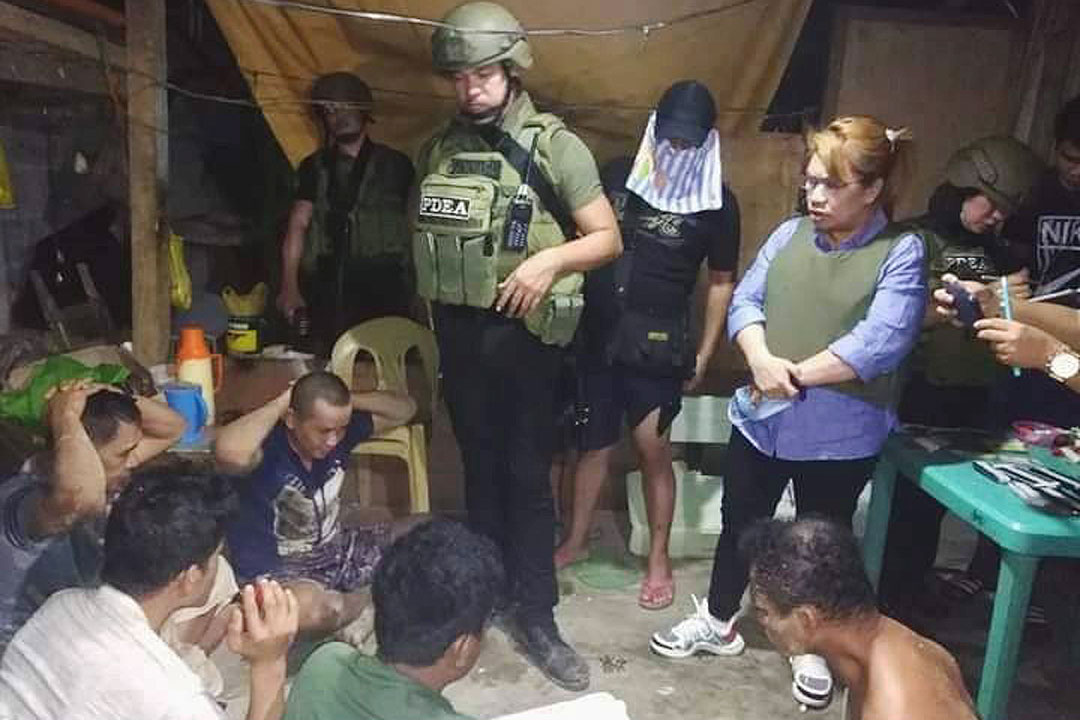Duterte not keen to become Marcos anti-drug czar

PRESIDENT Rodrigo R. Duterte has turned down an offer from his successor to lead the incoming government’s anti-illegal drug campaign, according to the tough-talking leader’s former lawyer.
At a state-led forum on Monday, ex-presidential legal adviser Salvador Panelo quoted Mr. Duterte as saying that “it is not my time.”
Philippine President-elect Ferdinand R. Marcos, Jr. on Thursday said he would consider making Mr. Duterte, 77, his government’s anti-drug czar.
“If he wants to,” he said at a televised news briefing about the possibility of his predecessor heading his administration’s anti-illegal drug campaign.
Mr. Marcos, Jr. noted that during the campaign Mr. Duterte and he had several meetings where the latter had urged him to continue the drug war that has killed thousands.
He said Mr. Duterte wanted him to enforce his own version of the anti-narcotics drive as long as it continues.
Mr. Duterte has started packing his things at the presidential palace after six years in office, according to the ABS-CBN News, citing Executive Secretary Salvador C. Medialdea. His term ends on June 30.
The president’s things have been sent to his hometown of Davao City as early as three months ago, he said. “He’s almost done,” he said in Filipino.
Mr. Duterte is free to choose whether he wants to serve as Mr. Marcos’ anti-drug czar, Communications Undersecretary Kris Ablan told a recent news briefing. But he said Mr. Duterte was “looking forward to his retirement.”
Mr. Duterte’s drug war has killed thousands of suspects, prompting domestic and international groups to file cases against him before the International Criminal Court.
In March, Mr. Duterte said he was ready to step down from office on June 30, citing his accomplishments in office.
Members of his Cabinet have touted his legacies during a two-day Malacañang-backed summit that started on May 30.
Mr. Duterte will leave behind a record amount of debt, which had swelled to P12.68 trillion as of end-March.
Experts have said the huge foreign debt would be a problem in his successor’s plan to enforce a multibillion stimulus package.
The Commission on Human Rights earlier said Mr. Duterte’s administration had encouraged a culture of impunity by hindering independent inquiries and failing to prosecute erring cops involved in the deadly drug war. Internal investigations of anti-drug operations that led to deaths have been “inaccessible and nontransparent,” it said in a 48-page report last week.
Survivors of Mr. Duterte’s war on drugs found it difficult to pursue justice despite overwhelming evidence because the state refused to cooperate with independent probers, the human rights body said.
Police have “refused, denied or ignored” subpoenas and requests from the commission to review police documents even if they followed guidelines to obtain the information, according to the report.
“Independent and impartial accountability mechanisms, such as the fact-finding investigations by the Commission on Human Rights (CHR), have been hampered by the predilection and uncooperativeness of agencies involved in the campaign against illegal drugs.”
Authorities have cited a 2017 order from Mr. Duterte “not to participate in any investigation into alleged human rights violations committed by its agents without his clearance,” the agency said.
The CHR report presented 882 drug-related cases involving 1,139 victims, or 23% of the 3,790 drug-related killings examined by the commission from 2016 to 2021. Of the total, 2,305 investigations were finished.
Police had used “excessive and disproportionate force” in most of the drug raids, contrary to their self-defense claims, it said. It added that 73% of 511 victims who had allegedly resisted arrest were killed by gunshots to the head and torso.
These indicated “intent to kill by the police operatives and disproportionality of force used to repel aggression,” CHR said.
It urged police to conduct “full, immediate, transparent and impartial investigations on drug-related extra-judicial killings.”
The Justice department should also investigate the cases related to the deadly drug war through the National Bureau of Investigation and “prosecute persons charged with the commission of these extrajudicial killings through the National Prosecution Service.”
The agency said DoJ should also regularly and automatically furnish the human rights body with “complete and comprehensive reports” on the cases.
The latest report was among the last CHR assessments on the Duterte government’s war on drugs. The terms of the agency’s head and four other commissioners ended on May 5.
Philippine prosecutors have filed charges in court against law enforcers in four cases and plan to probe 250 more of what could have been wrongful deaths in Mr. Duterte’s drug war, Justice Secretary Menardo I. Guevarra told the United Nations Human Rights Council in February.
An inter-agency committee formed 15 teams last year that probed extralegal killings and human rights violations involving the government’s anti-illegal drug operations.
The Justice department has dropped 29 cases from its list of extralegal killings and torture cases for lack of evidence.
The cases involved witnesses that could not be found or complainants who decided not to pursue their complaints, Mr. Guevarra earlier told reporters. — KATA



